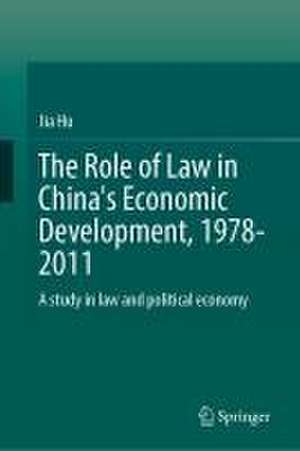The Role of Law in China’s Economic Development, 1978–2011: A Study in Law and Political Economy
Autor Jia Huen Limba Engleză Hardback – 30 mar 2024
Overall, the present book argues against the modernization theory and determinism that would anticipate a similar developmental path globally and shows that the relationship between law and economic development is contingent. Therefrom, this study weighs in the law and development debate and breaks a perception of static law in the economy by rejecting the conventional perception of established legal institutions as a precondition of modernity.
Hence, this book could appeal to legal scholars and sociologists interested in reevaluating western theories of free economy and its relationships to the law. In addition, scholars interested in research methodology would find the perspective of paradigm shifts in interpreting China's transformations a helpful analytical framework in research. Moreover, policymakers and legislators concerned about the characteristics of law for economic results would also find the book useful.
Preț: 947.50 lei
Preț vechi: 1155.48 lei
-18% Nou
Puncte Express: 1421
Preț estimativ în valută:
181.36€ • 197.07$ • 152.44£
181.36€ • 197.07$ • 152.44£
Carte tipărită la comandă
Livrare economică 21 aprilie-05 mai
Preluare comenzi: 021 569.72.76
Specificații
ISBN-13: 9789819999101
ISBN-10: 9819999103
Ilustrații: XV, 216 p. 3 illus., 2 illus. in color.
Dimensiuni: 155 x 235 mm
Greutate: 0.5 kg
Ediția:2024
Editura: Springer Nature Singapore
Colecția Springer
Locul publicării:Singapore, Singapore
ISBN-10: 9819999103
Ilustrații: XV, 216 p. 3 illus., 2 illus. in color.
Dimensiuni: 155 x 235 mm
Greutate: 0.5 kg
Ediția:2024
Editura: Springer Nature Singapore
Colecția Springer
Locul publicării:Singapore, Singapore
Cuprins
Law and Political Economy.- The Economy and the Rule System before the Reform.- The Paternalistic Role of Law, 1978-1991.- The Facilitative Role of Law, 1992-2001.- The Integrative Role of Law, 2002-2011
Notă biografică
Ms. Jia Hu received her legal training from China and Germany. She earned her Ph.D. from the Goethe University Frankfurt by completing a study concerning the interrelationship between law and China’s economic development (1978-2011), a topic she has devoted to since her early years of legal theory study in Frankfurt. Her present research was funded by the China Scholarship Council, and her specialized research areas include legal theory, Max Weber studies, sociology of law, law and public finance.
Textul de pe ultima copertă
This book concerns how China's legal institutions promoted its economic growth and demonstrates that the law has played different roles at various stages of China's economic transformation, a signal of legal paradigm shifts in reaction to the changing political and economic pursuits.
By decomposing the role of law in the process, the author argues that while the Chinese economy was transforming from a planned economy to a market-oriented one, the law also made its adjustment as a response—the Chinese legal system was evolving from the one consisting of primarily substantive laws to the one filled with high-level formal laws by the end of the last century. The above observation of legal formalization is further consolidated by introducing the particularities of China's legal education in those years—a topic rarely dealt with yet of significance to comprehensively understand the Chinese legal system in practice.
Overall, the present book argues against the modernization theory and determinism that would anticipate a similar developmental path globally and shows that the relationship between law and economic development is contingent. Therefrom, this study weighs in the law and development debate and breaks a perception of static law in the economy by rejecting the conventional perception of established legal institutions as a precondition of modernity.
Hence, this book could appeal to legal scholars and sociologists interested in reevaluating western theories of free economy and its relationships to the law. In addition, scholars interested in research methodology would find the perspective of paradigm shifts in interpreting China's transformations a helpful analytical framework in research. Moreover, policymakers and legislators concerned about the characteristics of law for economic results would also find the book useful.
By decomposing the role of law in the process, the author argues that while the Chinese economy was transforming from a planned economy to a market-oriented one, the law also made its adjustment as a response—the Chinese legal system was evolving from the one consisting of primarily substantive laws to the one filled with high-level formal laws by the end of the last century. The above observation of legal formalization is further consolidated by introducing the particularities of China's legal education in those years—a topic rarely dealt with yet of significance to comprehensively understand the Chinese legal system in practice.
Overall, the present book argues against the modernization theory and determinism that would anticipate a similar developmental path globally and shows that the relationship between law and economic development is contingent. Therefrom, this study weighs in the law and development debate and breaks a perception of static law in the economy by rejecting the conventional perception of established legal institutions as a precondition of modernity.
Hence, this book could appeal to legal scholars and sociologists interested in reevaluating western theories of free economy and its relationships to the law. In addition, scholars interested in research methodology would find the perspective of paradigm shifts in interpreting China's transformations a helpful analytical framework in research. Moreover, policymakers and legislators concerned about the characteristics of law for economic results would also find the book useful.
Caracteristici
Is the first one with extensive coverage over China’s thirty years of economic transformation Deals with the relationship between China’s law and economic development Weighs in the much-debated issue of law and development
